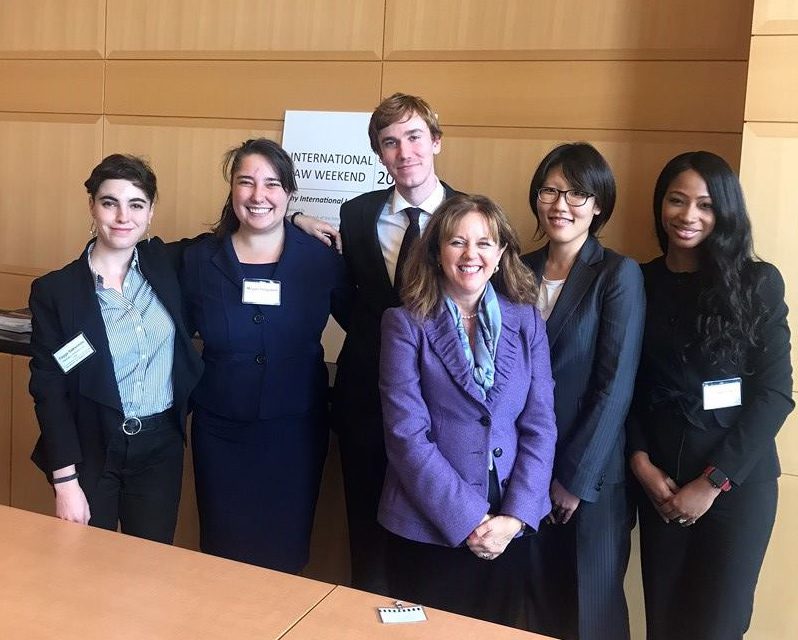By Feyga Saksonov
Last week, I had the privilege of attending the American Branch of the International Law Association’s (ABILA) 2018 International Law Weekend, held in New York City October 18-20, as an ambassador for the Harris Institute, directed by ABILA’s new President-Elect Professor Leila Sadat.
I attended a panel on identity in the age of blockchain and refugees. It was a roundtable discussion by experts in immigration and refugee law, international law, technology, and data privacy – all women, which in the intersection of law and technology felt to me like a minor miracle. The topic focused on the idea of a decentralized blockchain-based form of internationally recognized identity, which would streamline immigration and address the issue of statelessness in refugee law.

There were four panelists at this discussion. The first was Sahar Hafeez, an associate at Pillsbury Winthrop Shaw Pittman LLP’s Washington D.C. office specializing in international trade law. She offered an economic perspective and discussed how such a form of identity would influence international trade and cooperation. The second panelist was Lucia Gallardo, the founder and CEO of Emerge, a company using blockchain and related technologies to streamline the process of granting asylum and refugee resettlement. She addressed the technological side of the issue, as well as practical applications to immigration and refugee law. The third panelist was Paula Berman of Democracy Earth, a group working on an open-source decentralized online voting interface. She spoke about the importance of data privacy and decentralization of information, as well as the role of technology in the modern world. The final panelist was Catherine Chen, founder and CEO of IG Liaison Strategy and Business Consulting and an expert in information privacy and governance. She reflected on the privacy aspect of creating such a form of ID and how to handle potential issues. The discussion was moderated by Isabelle Figaro, a New York attorney with a technological background.
Blockchain is a way to store information in a decentralized, user-controlled format where each data point is in its own slot, or “block”, which connects with other “blocks” to form a “chain” that can then be read as, say, an identity document. One advantage of such a mechanism is that if one of the blocks is corrupted or falsified, it is easy to identify the problem and contain a potential data breach. Another advantage, specifically in the context of identity documents, is that instead of giving control of the information to a centralized government agency, storing it in blockchain allows the “user” – the subject of the data, in this case the person carrying the identity document – to control it. Further, it allows the user to store more information than a standard passport or similar document, thereby allowing a more thorough verification of identity.

A blockchain-based ID would have multiple advantages over a traditional passport. Firstly, it would be borderless and transnational – it could be accessed and reviewed from any point on the globe due to its decentralized, user-owned nature. This would be a boon for refugees, who currently often find themselves unable to prove their identity, either because they do not have identity documents from their country of origin, or because those documents are no longer valid. Secondly, a digital blockchain-based ID would be able to store not only biometric or passport data, but also some data on the owner’s habits – their internet use, such as Netflix viewing patterns or Instagram likes, and other behavioral biometrics. This would allow for more thorough verification of identity, and reduce instances of fraud, a major concern in today’s immigration law.
There are two major concerns with such a system of identification. First, each country has different laws concerning privacy and data security, the most comprehensive of these being the GDPR in the European Union. If we were to create a global, borderless system of identification based on blockchain, it would need to comply with the privacy and security laws of every country. The blockchain structure would therefore be integral to such a system, as it is currently one of the most secure methods of data storage and management. Second, there is an issue of how much control should be granted to individuals – for instance, it should not be possible to edit things like education or criminal history. It is difficult to draw a line around what should be decentralized and user-owned and what should not, but would theoretically be possible.
The general view of the experts was that the benefits of having a decentralized, universally portable, and accessible system of identification outweighs any concerns. Such a system could almost solve the issues of statelessness (see, for example, what the Rohingya Project is trying to do for stateless Rohingya refugees). Moreover, it would streamline the process of immigration and travel, along with almost any other process that requires identification, such as voting or formal employment authorization. The experts seemed to agree that such a system was the future, and that blockchain was the way to do it.
